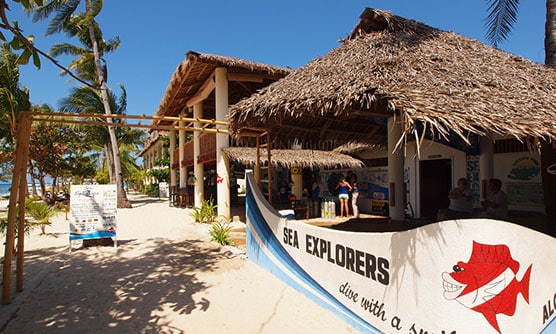Your Guide to the Best Diving Experience
If you are planning to go scuba diving in the Philippines, you’re in the right place.
In this post, we’ll share with you a quick helpful guide so you can have the best diving experience in the country, including how to choose the best dive center in the Philippines, the “dos” and “don’ts” in diving, and preparing for a dive in the Philippines.
Best dive centers Philippines: choosing the best one
The Philippines is home to some of the best dive centers in the world, each with their unique features and offerings. From world-renowned dive sites in Palawan to the colorful reefs of Cebu, there are plenty of options for divers of all skill levels. With so many beautiful islands and a number of dive centers available, it can be overwhelming to decide which one to go for.
Best dive center Philippines: why find the best one?
For starters, the quality of your diving experience largely depends on the dive center you choose. A good dive center will have experienced and knowledgeable instructors, well-maintained equipment, and a focus on safety. On the other hand, a subpar dive center can lead to a less enjoyable and potentially dangerous experience.
Choosing a dive centre in the Philippines: factors to consider
Here are some of the most important things to keep in mind when choosing the best dive center in the Philippines
- Location: The location of the dive center should be convenient for you. Consider the proximity to the dive sites on your bucket list, your accommodation, and maybe other tourist attractions. Some of the best dive sites in the Philippines are located in remote areas, so you will also need to consider transportation options as well.
- Facilities and equipment: A good dive center should have modern, well-maintained equipment, including tanks, regulators, and wetsuits. The center should also have ample space for divers to gear up, rinse off, and relax between dives.
- Instructor qualifications and experience: The quality of your diving experience largely depends on the experience and qualifications of your instructor. Look for dive centers with instructors who have extensive experience and are certified by reputable organizations.
- Safety measures: Safety should be a top priority for any dive center. Make sure the center has clear safety guidelines and procedures in place, and that they conduct thorough safety briefings before each dive. The center should also have trained staff on hand to handle any emergencies that may arise.
- Certification and accreditation: The dive center should be certified and accredited by reputable organizations, such as PADI, SSI, or NAUI. This ensures that the center adheres to strict safety standards and employs qualified instructors.
- Good reviews: Be sure to read reviews and choose a dive centre in the Philippines with good feedback from customers. The actual experiences from other divers will serve as one of your best gauges of a reliable Philippines dive center.
By considering these factors when choosing a dive center in the Philippines, you can ensure that you have a safe and enjoyable diving experience.
Best dive centre philippines: Top 5
To help you begin your search for the best dive center in the Philippines, we’ve rounded up the top 5 dive operators in the county.
Sea Explorers
Sea Explorers is a well-established and one of the most experienced dive operators in the country. It operates three dive centers, including Malapascua in Cebu, where you can get the chance to spot the remarkable thresher sharks, as well as the famous dive spots in Dauin and Sipalay in Negros Island. Apart from the dive trips, Sea Explorers also offers island hopping services and PADI courses up to instructor level in almost any language.
El Nido Resorts
El Nido Resorts in Palawan is another top-rated dive center in the country, known for its breathtaking dive sites, including the Tubbataha Reef National Marine Park, a UNESCO World Heritage Site. The center also offers a range of other activities, such as island hopping and kayaking.
Dive Society
Boracay Dive Society is an award-winning dive center located in Boracay, offering a range of dive courses and certifications. The center also offers guided dives to some of the best dive sites in the area, including Yapak, Crocodile Island, and Friday’s Rock.
Atmosphere Resorts & Spa
For a luxurious diving and vacation experience, you may try the Atmosphere Resorts & Spa in Dumaguete, Negros Island. It is a luxurious dive center that offers great diving experiences, complete with stunning coral reefs and diverse marine life. The center also has a high-end spa and wellness center, perfect for relaxation after a long day of diving.
Arizona Dive Shop
This dive shop in Subic Bay is well-regarded for its professional dive services and expertise in wreck diving. They offer a range of courses and guided dives to explore the historic shipwrecks in the area.
Philippines dive centre: tips for a memorable diving experience
To have a fun, safe, and unforgettable diving experience in the Philippines, below are some tips to follow.
Dos and Don’ts when diving in the Philippines
While the experience is extraordinarily different, diving in the Philippines is just like diving in other places when it comes to “dos” and “don’ts”.
Dos:
- Get proper training: Ensure you have the necessary scuba diving certifications and training for your skill level. Take refresher courses if you haven’t dived in a while.
- Choose a reputable Philippines dive center: Select a dive operator with certified instructors and a good safety track record. Read reviews and ask for recommendations.
- Plan ahead: Plan your dive trips in advance, including accommodations and transportation. Make reservations for popular dive sites or resorts.
- Check equipment: Inspect your dive gear and ensure it is in good working order. Rent equipment from reputable shops if necessary.
- Dive within your limits: Dive to your certification level and experience. Avoid attempting advanced or technical dives without the appropriate training.
- Follow safety procedures: Listen to dive briefings, adhere to dive profiles, and practice good dive etiquette. Use safety equipment such as dive computers and surface markers.
- Respect Marine Life: Maintain a safe distance and refrain from making sudden or abrupt movements that could startle or stress the creatures you encounter. This allows you to observe their natural behaviors without causing harm or disturbance.
Don’ts:
- Don’t dive without certification: Never attempt scuba diving without proper certification and training. It’s both unsafe and illegal to do so.
- Don’t dive if you’re unwell: If you are feeling unwell or have any medical conditions that could affect your diving, don’t go diving until you are in good health and have consulted a physician if necessary.
- Don’t touch or disturb marine life: Avoid touching, chasing, or disturbing marine animals and coral reefs. This can harm the delicate ecosystems and is disrespectful to the environment.
- Don’t feed marine life: Feeding fish or other marine creatures can disrupt their natural behavior and diet, potentially leading to negative ecological consequences.
- Don’t collect souvenirs: Do not collect shells, coral, or any marine life as souvenirs. Leave everything as you found it to protect the underwater environment.
- Don’t leave trash behind: Dispose of your trash properly, both on the boat and underwater. Be mindful of waste and use eco-friendly products whenever possible.
- Don’t overstay bottom time: Stick to your planned dive profile and don’t exceed your dive time or depth limits. Overextending your bottom time can lead to decompression sickness.
- Don’t ignore dive briefings: Pay close attention to pre-dive briefings provided by your dive guide or instructor. They provide valuable information about the dive site and safety procedures.
- Don’t remove equipment underwater: Avoid removing or adjusting your equipment underwater unless you are properly trained to do so in an emergency situation.
- Don’t panic: If you encounter a challenging situation underwater, such as strong currents or equipment malfunctions, remain calm and follow your training. Panic can lead to unsafe decisions.
- Don’t solo dive: Always dive with a buddy. Solo diving is generally discouraged due to the increased risks involved.
- Don’t ignore local rules: Respect local regulations, marine protected areas, and dive site rules. Ignoring them can lead to fines and damage to the environment.
By adhering to these “dos” and don’ts,” you’ll contribute to safe and environmentally responsible scuba diving in the Philippines while also preserving the beauty of its underwater world for future generations.
How to prepare for a dive
If you decide to dive in the Philippines, here’s a quick guide on how you can prepare:
Destination and dive center
- Choose your dive destination in the Philippines.
- Select a reputable dive center or operator.
- Make accommodation reservations.
Certification and equipment
- Ensure your scuba diving certification is current.
- Check your gear’s condition or arrange rentals.
- Pack essentials like swimwear, sunscreen, and personal items.
Travel plans and documents
- Plan your travel, including flights and local transport.
- Verify your travel documents.
Health and rest
- Get adequate sleep and stay well-hydrated before your dive.
- Avoid excessive alcohol consumption.
Pre-dive review
- Familiarize yourself with dive sites and conditions.
- Review dive tables or computer settings.
Safety and briefing
- Attend pre-dive briefing for site details and safety guidelines.
- Arrive early at the dive center.
Equipment check
- Before entering the water, thoroughly inspect your gear.
Fuel up
- Eat a light meal for energy before diving.
Enjoy the dive
- Relax and follow safety protocols.
- Respect marine life and the environment.
By following these steps, you’ll be well-prepared for a safe and enjoyable scuba diving experience in the Philippines.
Dive center Philippines guide: takeaway
Whether you’re a beginner or a seasoned diver, remember that your choice of a dive center can make all the difference in creating an extraordinary diving experience in the beautiful waters of the Philippines. So, follow this guide and enjoy your next diving adventure.




